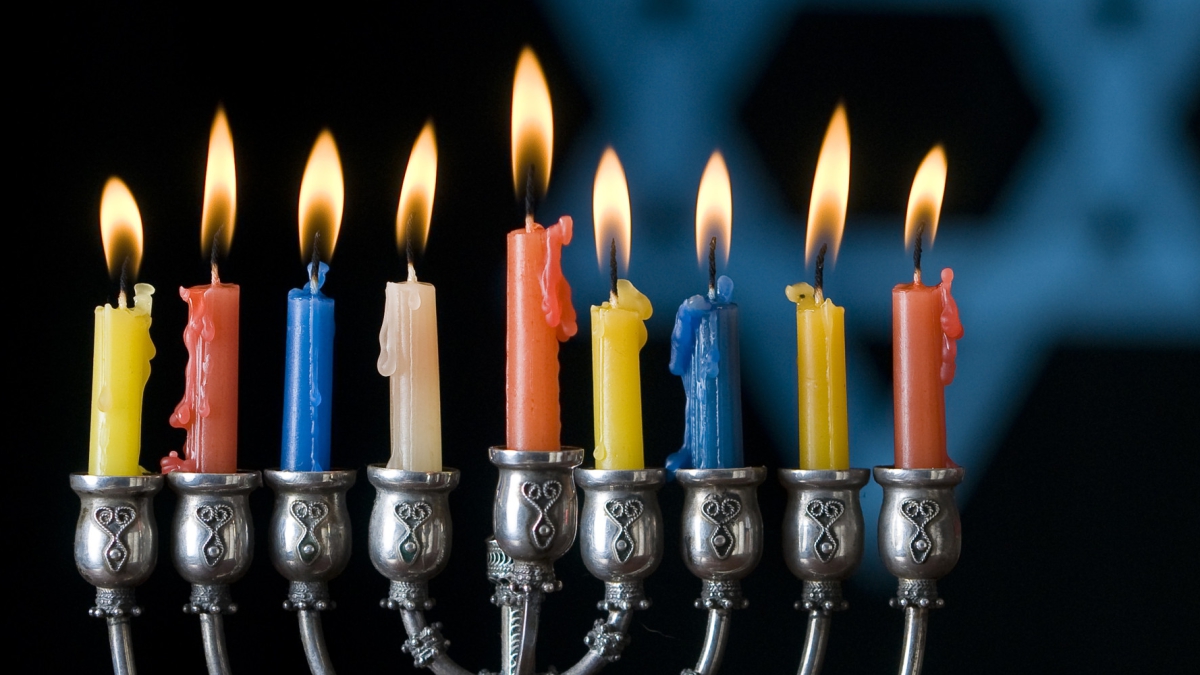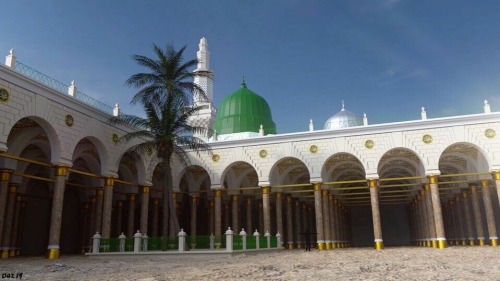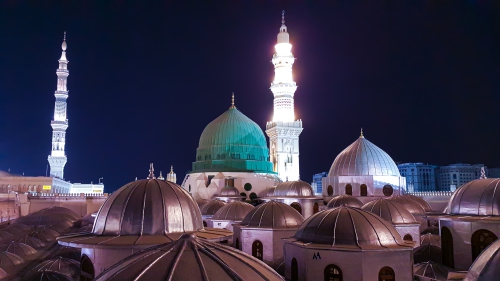Hanukah Oil: A Mythic Reality+

Hanukah (Hebrew for Dedication) refers both to: The rededication of the ancient Temple in Jerusalem after it was profaned in 168 BCE by an idol installed in it by the Syrian Greek king Antiochus IV; and
The dedication and valor of the Maccabees and all those who joined them in their Jihad resistance to the attempt by the ruling powers to force the Jews to abandon their God given religion, and conform to Greek forms of worship and culture. Abandoning circumcision was one example.
Those who resisted, and their 25 year long dedication to the Jihad struggle, eventually led to religious freedom and national independence for the Jews living in the Land of Israel.
The oppression of Judaism by Antiochus IV, the Syrian Greek king, was the first known attempt at suppressing a minority religion, but unfortunately not the last. Other well known attempts were the three century long Roman persecution of Christianity, and the persecution of Muhammad and his followers by the majority of the pagan Arabs in Makka.
All three religions emerged from their varying periods of persecution stronger than ever, and this is the ongoing spiritual lesson of the Hanukah lamp. A oil lamp, once lit by faithful believers, filled with hope and trust in God, can last longer than all the realists and negativists thought was possible.
The history: In 200 BCE, King Antiochus III of Syria defeated Egypt and made the Land of Israel a part of the Seleucid Empire. King Antiochus III wanting to conciliate his new Jewish subjects guaranteed their right to "live according to their ancestral customs" and to continue to practice their religion in the Temple of Jerusalem.
However in 175 BCE, his son Antiochus IV invaded Judea to put in power a pro Syrian high Priest. As the first century Jewish historian Josephus relates: "The king came upon the Jews with a great army, took their city by force, slew a great multitude of those that favored Egypt, and sent out his soldiers to plunder them without mercy. He also spoiled the temple (erecting an idol in it that looked like himself, and thus) put a stop to the daily offerings (to God) for three years and six months."
The tradition: When the Temple in Jerusalem was looted and services stopped, Judaism was outlawed. In 167 BCE Antiochus IV (who named himself 'Manifest God') ordered an altar to Zeus be erected in the Temple. He banned circumcision and ordered pigs to be sacrificed at the altar of the Temple.
This provoked a large-scale revolt. Mattityahu, a small town Jewish priest, and his five sons Jochanan Simeon, Eleazar, Jonathan, and Judah led a rebellion against Antiochus. They became known as HaMakabim (the Hammers).
In 166 BCE Mattathias died, and Judah Makabee took his place as leader. By 165 BCE the Jewish revolt against the Seleucid monarchy was largely successful. The Temple was liberated and (Hanukah) rededicated. The festival of Hanukah was instituted to celebrate this event.
The oil: Judah Makabee ordered the Temple to be purified, and a new altar to be built in place of the one polluted by pig's blood. According to the Torah, pure olive oil was needed for the menorah in the Temple, which was required to burn day and night throughout the year.
However, there was only enough pure oil found to burn for one day, and it would take a week to prepare a fresh supply of pure oil for the menorah. Some said delay the Hanukah of the Temple for a week. Others said kindle the Temple Menorah and pray for it to last until new pure oil could be made.
The menorah was lit; and it did not go out prior to the arrival of the new pure oil. An eight-day festival was declared by the rabbis to commemorate this miracle.
The eight days: In Biblical days the two most widely celebrated Jewish Holy days were the week long pilgrimage festivals of the Passover Exodus from Egypt; and Sukkot—the fall harvest festival. Each lasted seven days, but in the Torah, Sukkot had an extra day attached to it making it a combined eight day festival. When Solomon dedicated the First Temple in Jerusalem the celebration lasted seven days and on the eighth day the people went back home.
For three years, while the Temple was polluted by the Syrian Greek statue of the king, Jews boycotted the Temple. When the Makabees recaptured Jerusalem and the Temple Mount just eight weeks after the end of Sukkot, they purified the Temple and called it’s eight day (like Solomon) rededication ‘Sukkot in December”.
The lights: These can be candles or oil lamps. Most Jewish homes have a special candelabrum referred to as a hanukiah, or an oil lamp holder for Hanukah, which holds eight lights plus the additional light used to light the others each day.
The reason for the Hanukkah lights is not to "light the house within", but rather to "illuminate the house without," so passersby should see it and be reminded of the holiday's miracle. Thus, lamps are set up at a prominent window or near the door leading to the street. Some Ashkenazim (Jews from European Lands) have a separate menorah for each family member (customs vary), whereas most Sephardim (Jews from Muslim Lands) light one for the whole household.
Only when there was danger of antisemitic persecution were lamps supposed to be hidden from public view, as was the case in Persia under the rule of the Zoroastrians, or in parts of Europe before and during World War II.
The spiritual politics: In the generation after the massive failure of the Bar Kochvah rebellion against the Roman Empire, the sages of Israel carried out a sustained campaign against Hanukah with the intent of demilitarizing and emasculating Hanukah and turning it from a celebration of Jihadi military victories and political successes, into a spiritual Jihad tribute to the ability of faith and trust in God to deliver Israel from danger.
The rabbis eliminated the feast of Nikenor´s Day, which celebrated Judah Makabee´s killing of a Syrian Greek general named Nikanor, in direct hand to hand combat. The Rabbis decided that the Fast of Queen Esther mentioned in book of Esther took place on the same day as Judah Makabee’s victory, and since it is impossible to observe both a feast and a fast on the same day Queen Esther´s piety squelched Judah Maccabees´s military prowess.
For the Jews of Babylonia, Hanukah and the story of the victorious military struggle presented a problem. They feared their young people would be influenced by the model of the Makabees and become “militant activist” opponents of authority. When the majority of Jews lived in the Land of Israel a revolt might succeed; but when the majority of Jews lived as small minorities throughout the Roman and Persian Empires a revolt would lead to catastrophe.
It was not possible to eliminate Hanukkah; it had become firmly entrenched in the hearts and minds of the people. But the Hanukah miracle could be, 4-5 centuries later, enhanced and changed from one celebrating a miraculous military Jihad victory against overwhelming odds, into a miraculous spiritual Jihad story of faith and hope symbolized by a “little jar of oil.”
The jar of oil story is first told in the Babylonian Talmud (Shabbat 21b): “Our rabbis taught: On the 25th day of Kislev begin the eight days of Hanukkah on which fasting is forbidden. For when the (Syrian) Greeks entered the Temple, they defiled all the oil; and when the Makkabees prevailed and defeated them, they searched and found only one jar of oil with the official seal of the High Priest, but it had only enough for one day’s lighting; yet a miracle occurred, they lit the (eternal) lamp with it and it (burned) for eight days. The following year these days were decreed a festival.”
Rabbi Maller's web site is: www.rabbimaller.com. His new book ‘Judaism and Islam as Synergistic Monotheisms: A Reform Rabbi's Reflections on the Profound Connectedness of Islam and Judaism’ (a collection of 31 articles by Rabbi Maller previously published by Islamic web sites) is now for sale ($15) on Amazon and Morebooks.

















